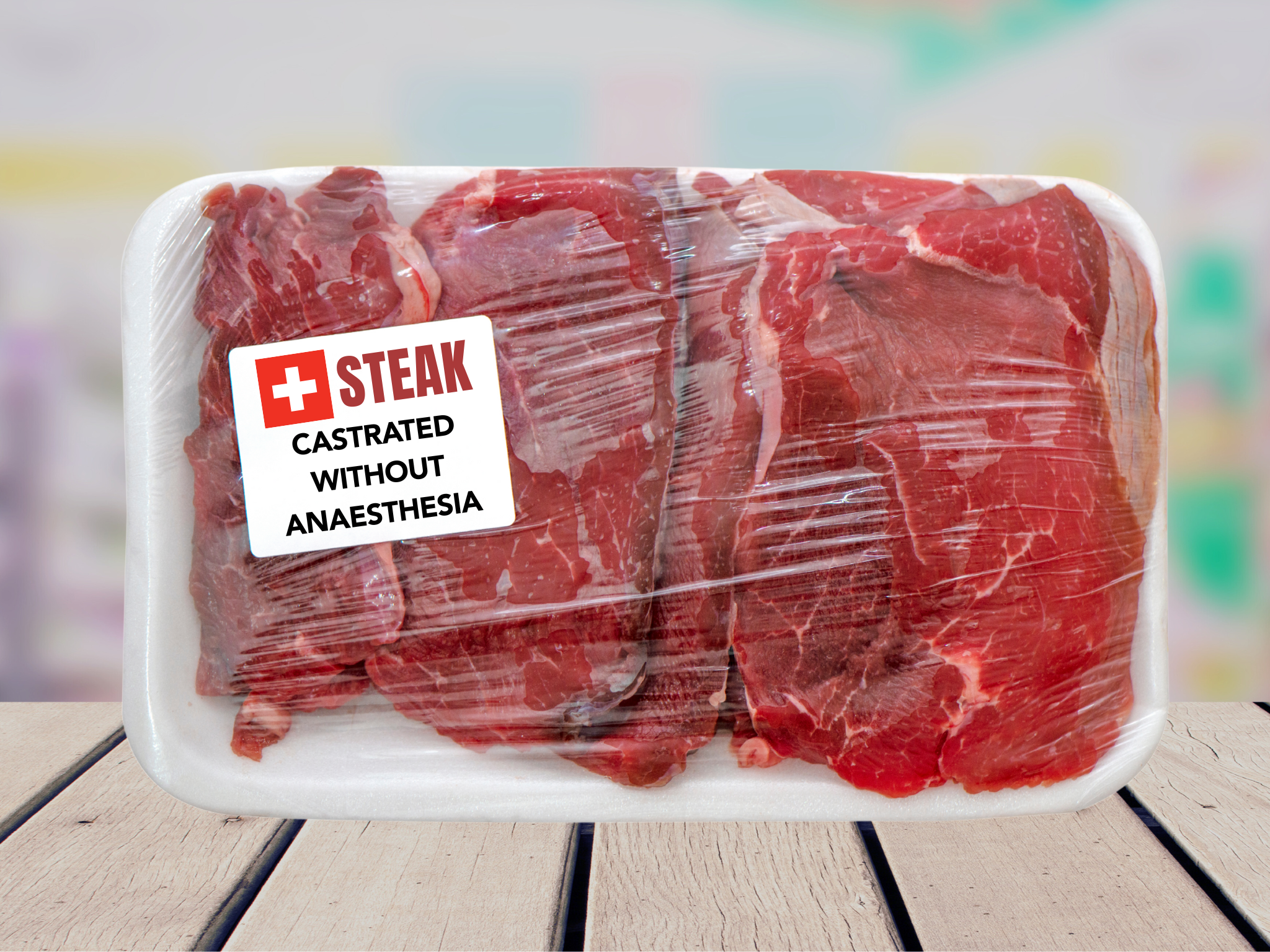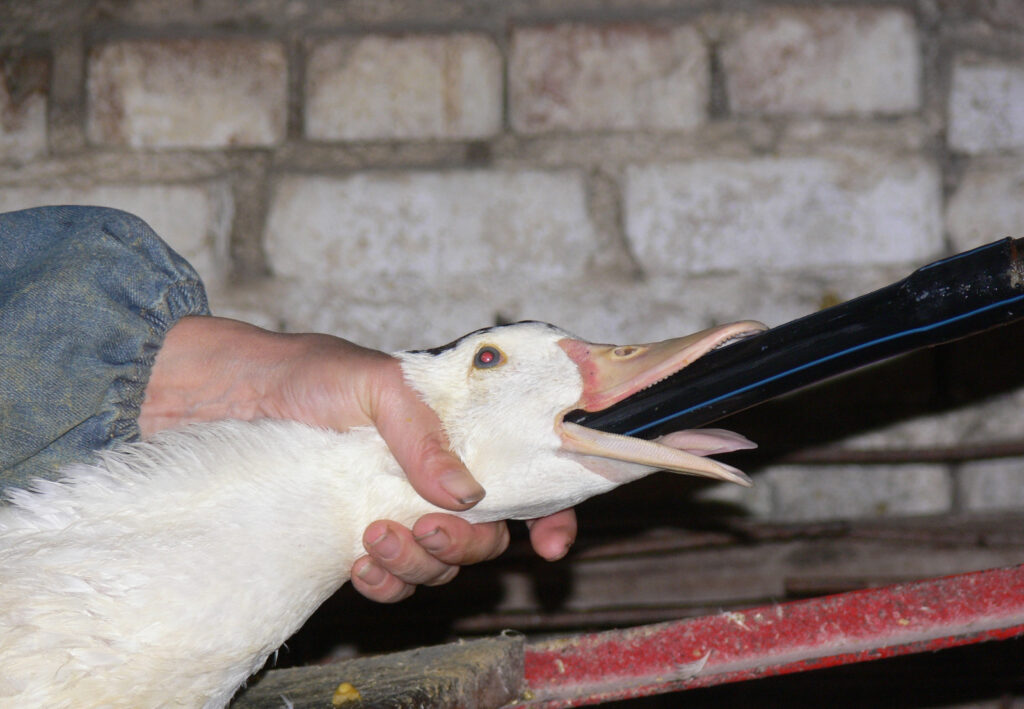
The Swiss government has approved new labelling rules that mandate businesses to declare if the meat and dairy products they’re selling are linked to animal suffering.
In a big win for animal rights activists and food transparency, Switzerland now requires meat, dairy and egg labels to show if they were produced through painful procedures without anaesthesia or stunning.
The new ordinance is designed to give consumers clearer information about animal proteins and help them make informed purchasing decisions. In addition, it aims to encourage the livestock sector to transition to more ethical practices.
“When purchasing animal products such as meat, milk, or eggs, consumers will in future have access to additional information about the production method,” the Federal Council said. “This will enable them to determine whether these foods were produced using painful procedures without the animals being anaesthetised beforehand.”
The labelling requirement came into effect on July 1 and is accompanied by a transition period of two years.
Switzerland tackles frogs, fur and foie gras

The regulation is applicable to all businesses that offer such foods, including restaurants, startups and food producers, and retailers. They’re required to check if they are subject to the declaration’s requirement, as part of a self-regulation approach.
According to the Federal Council, such products include beef derived from cattle castrated or dehorned without anaesthesia, dairy from cows dehorned without pain relief, and eggs and meat from chickens whose beaks are clipped without pain relief. Pigs that are castrated or whose tails are docked and teeth clipped without anaesthesia fall under the category, as do frog legs obtained without anaesthesia.
Notably, foie gras is part of the decree too. The highly prized delicacy is associated with the force-feeding of geese and ducks, which can damage the livers of the birds and lead to a painful disease called hepatic lipidosis.
Such animal welfare concerns have prompted over a dozen countries to ban foie gras production. Switzerland itself has prohibited force-feeding for over 40 years. Now, foie gras sold and imported in the country would need to come with an animal cruelty disclosure.
It will give a boost to food tech startups producing cruelty-free alternatives, which might gain more favour with consumers. French firm Gourmey, for example, produces cultivated duck to make foie gras, and has applied for regulatory approval in Switzerland.
The Federal Council has also placed a ban on the imports of fur produced through animal cruelty. While the Europe-first move was welcomed by animal rights activists, they said it didn’t go far enough.
“The term ‘cruel to animals’ is not interpreted consistently. The ban does not include particularly cruel traps, which are designed to kill instantly but often fail, leaving the trapped animals to die in agony for days,” said Thomas Pietsch, head of wild animals in textiles at welfare group Four Paws.
Government is inhibiting plant-based meat with labelling too

It’s not the first time the government has intervened to protect consumers from the dangers of the animal protein trade. Last year, the canton of St Gallen banned the sales of meat and dairy with higher levels of PFAS (a group of 15,000 ‘forever chemicals’ that accumulate in our bodies instead of breaking down) than the maximum permitted limit.
The canton’s decision followed the discovery of excessive levels of PFAS in meat and milk from five farms. These chemicals are linked to serious health issues, like kidney disease, liver damage, thyroid problems, cancer, neurological damage, autoimmune disorders, birth defects, and developmental issues.
St Gallen called on the national government to implement a national action plan to tackle the country’s growing PFAS problem, since there’s a threshold for certain foods, though not for meat and dairy products.
With the Swiss cutting back on their meat consumption anyway, it opened up an opportunity for plant-based companies to regain consumers’ waning interest in their alternatives. However, their efforts have been hindered by Switzerland’s highest court, which in May overturned a 2022 decision that allowed vegan producer Planted to use meat-like terms on its product labels.
The ruling came after an appeal from the Swiss government. And just a month prior, the federal agricultural research centre, Agroscope, had stated that labels on non-dairy milk can “overwhelm” consumers and often be misleading. These efforts are contradictory to consumer beliefs, as well as the government’s own dietary guidelines.
Switzerland’s move comes amid an increased focus on animal welfare policies across the world. German discount retailer Aldi Süd reorganised its fresh meat displays to reflect animal welfare standards in May, introducing a colour-coded system grouping products by the conditions in which they were raised.
In Asia, more than 175 companies have improved their sourcing policies in light of sustainability and animal welfare since 2022, while free-range egg commitments are on the rise globally (although the EU has reneged on its promised caged farming ban).
The post In Switzerland, Meat Labels Must Now Disclose Animal Cruelty Practices appeared first on Green Queen.
This post was originally published on Green Queen.